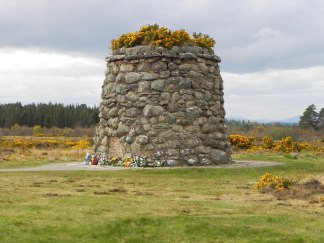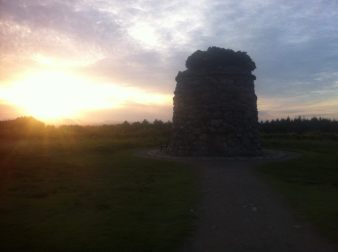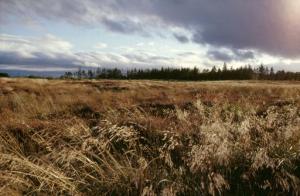The Battle of Culloden is largely seen as a British, and Scottish affair, with the fall of the Jacobites accelerating the demise of the Highlands, but Culloden can be viewed on a much larger scale and it is fascinating to see how the ’45 Rising and the Battle of Culloden affected events across the world.

In the build up to the ’45, the Battle of Fontenoy can be considered a part of its history. Here an army of British, Dutch, Hanoverian and Austrian regiments were defeated by the French. The commander of the allied army was none other than the Duke of Cumberland and his failure at Fontenoy could well have contributed to Prince Charles’ timing with his decision to sail to Scotland in 1745. Not only that, but with an embarrassing defeat behind him, it has to be questioned whether this spurred the Duke of Cumberland on to defeat the Jacobites so he could then return to the Continent and stop the French after Fontenoy denied this.
In the month before Prince Charles Edward Stuart arrived in Scotland to begin the ’45 Rising, Royal Navy ships were across the Atlantic seizing the French fortress of Louisbourg which protected the Gulf of St Lawrence. This defeat left the French at a crucial decision. Should they send reinforcements to try and retake Louisbourg or should they support the Jacobites in their attempt to take Britain? Initially they supported Charles, but following his apparent failure to secure Scotland and his retreat at Derby, France soon turned their attention back west and by spring 1746 there were 11,000 troops being sent, not to Scotland, but across the Atlantic as they fought to hold the French empire together.
After Culloden those that were fortunate to survive then faced uncertain prospects and Highland regiments were soon used in the French-Indian Seven Years War, as well as the American Revolution. In 1756 Simon Fraser of Lovat, the son of the executed Lord Lovat, raised a Highland regiment that served with distinction in Canada and slowly the men who had been brought up and fought with the Jacobites found new lives.
During the American Revolution Jacobites, including those raised by Simon Fraser, the Macphersons of Cluny and the Mackenzies of Cromartie fought with Britian in its unsuccessful attempt to keep hold of North America. After the British were defeated many soldiers fled north seeking refuge in Canada. One group of Scots formed the Glengarry settlement, in what is now Ontario, and this attracted immigrants from the Highlands for years. Indeed by 1832 it is said roughly 8,500 people were living in the settlement.
Finally, we cannot forget about the many prisoners who were transported overseas. Between 1718 and 1776 it is estimate that some 50,000 men and women were sent across to Virginia and Maryland in America. With the end of the American War of Independence Britain then turned to Australia and began sending its convicts there. Between 1787 and 1868 some 150,000 convicts were sent to Australia. Some of these prisoners/convicts could well have been Jacobites or at least affected by the events of the Jacobite Risings. These convicts were joined by many people seeking a new life away from the Highland Clearances and turmoil of Scotland. In fact three of the first six governors of New South Wales were Scots, including Lachlan Macquarie, sometimes called the ‘father of Australia’.
The Jacobite history and its aftermath has led to Scottish ancestry being taken across the world. Not all of the stories and events surrounding the Jacobites may be happy or pleasant but, what is wonderful now, is that we get to welcome visitors from across the globe to come to Culloden and discover more about their ancestors from Scotland, of the events that shaped Britain and of the men who took part in history across the world.
This is just a brief look at some of the ways Culloden acted as so much more than just one battle and there are many more stories that begin in Scotland and travel far and wide. We hope you enjoyed these and as always please like, tweet, share, comment and share your own stories with us.
All the best, K & D


Reblogged this on Adventures and Musings of an Arch Druidess.
LikeLike
Thank you ,
I found all your information so interesting.
LikeLike
Perhaps an even more far reaching result of Charles’ inability to retake the British throne was the continued hostility between the Hanover kings and the French. Had Charles been successful and made good on his promise of an alliance with Louis in return for support, the French most likely would not have allied themselves with the Americans against Britain in the Revolutionary war. Without French help would the American Revolution have failed? That is most likely as well. The American Revolution led to the French Revolution partly because the French peasants were under an ever increasing tax burden to the pay Louis’ debts incurred by supporting the Americans. But perhaps it was the ideals of the American Revolt and the fact that it succeeded that lent the support needed for a revolution in France.
Now imagine a world where the American Revolution had failed and the French Revolution had never taken place. Would Democracy have developed? Who would have come to the aid of Europe in World War II? With the Scottish Diaspora following Culloden, were carried the ideas that shaped modern society. Most import of those ideas was the idea that every child should be educated. As practiced in Scotland, it quickly took hold where the Scottish immigrants settled in North America and Australia. An educated populous is the basis of democracy and an educated work force has created our prosperity.
Was the battle of Culloden the beginning of our modern world? It’s something to think on!
LikeLike
Think you should do a little more reading of good scholarship, Susan. “Had Charles made good on his promise of an alliance with France.” what? Prince Charles Edward kept his part of his bargain with Louis XV, it was the French who betrayed the deal – especially after they made a treaty with Austria.. It may be a stunning surprise to you, but Britain was ruled by an elected Parliament, albeit a corrupt one, since the late Tudors. America was not the birth of democracy, which was born in ancient Greece, traveled briefly to Rome, and practiced in Switzerland for centuries.
LikeLike
Years ago, I sat at the base of that monument – it had taller, wild grass back then. A group of us went there for a reason: We were a mixture of Scottish and English, Welsh and Irish, American and even a Kiwi, and we went to symbolically speak out forgiveness and reconciliation across the generations. It was a profound moment for everyone in the group.
LikeLike
Your information on the indentures of Jacobite prisoners after Culloden is not accurate. What sources are you using?
LikeLike
We use a number of historical texts and reference books as well as data from relevant organisations. However, if you do spot an error please let us know so we can correct it as soon as possible.
LikeLike
What became of the French who fought at Culloden?
Were some transported to the “colonies” in America?
LikeLike